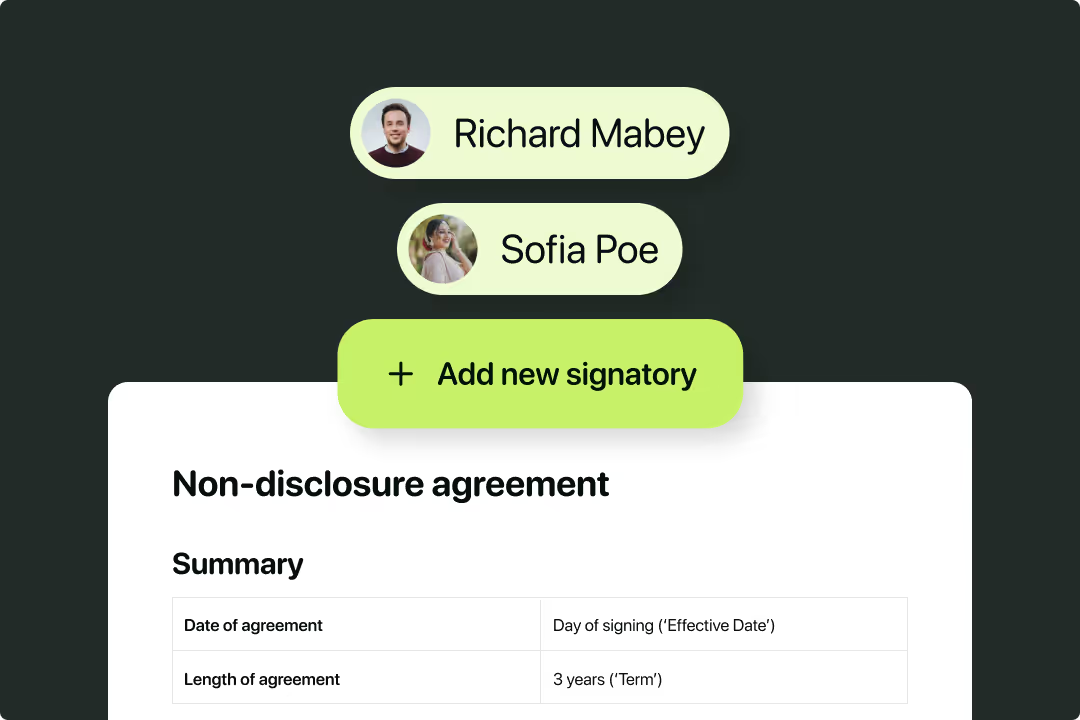Solutions
Customer Support
Resources
Looking for a fast and efficient way to create contracts? Contract assembly software could be exactly what you need.
Contract assembly software is the technology used to automate the contract creation process, usually by combining pre-defined templates with key transaction or party information.
Instead of drafting terms from scratch each time, a contract is assembled automatically by pulling contract data directly into a template to populate the agreement.
Using contract assembly software can significantly reduce the time legal and business teams spend drafting contracts and enable them to focus on higher value, more strategic tasks instead.

Contract assembly transforms the manual, repetitive process of contract creation into an efficient, automated workflow. At its core, it involves combining pre-approved templates, conditional logic, and user input to produce tailored, legally compliant agreements quickly and accurately.
The process begins with template creation, where legal teams design master templates for commonly used agreements, such as NDAs, sales contracts, or employment offers.
These templates serve as the foundation for assembly and include fixed language for standard clauses, placeholders for variable information like party names or dates, and conditional logic to adapt to different scenarios. For instance, a clause about governing law might automatically update depending on the jurisdiction chosen during the assembly process.
Once templates are in place, the system enables user input through guided forms or integrations with existing tools. A salesperson, for example, might initiate a contract directly from a CRM like Salesforce by entering client details or selecting pre-configured options, such as payment terms or service levels.
These inputs are used to populate variable fields in the template and trigger specific rules that determine which clauses or terms to include. This automation ensures the final document is not only accurate but also tailored to the specific deal or situation.
With the data provided, the system generates a complete contract, merging the template, input data, and logic. At this stage, many contract assembly tools offer built-in features for contract collaboration and review.
Stakeholders, such as legal or management, can review the draft in real time, using in-app commenting and redlining tools to suggest or make edits.
This collaborative review eliminates the need for back-and-forth emails and reduces the risk of errors. Validation tools in the platform ensure that contracts comply with organizational standards and flag any missing or conflicting terms.
Contract assembly software works by automatically populating and customizing contract templates. This can be achieved in two main ways when you use Juro's contracting platform:
One way to assemble contracts is to pull the relevant contract data in from a Q&A form.
For example, Juro users can fill out a simple series of questions in the platform. Their answers are then used to populate the relevant smartfields and form the contract metadata.
This is a user-friendly and intuitive way to make sure information ends up in the right place within a contract, reducing risk as a result.
Another way to assemble contracts quickly and efficiently is to integrate your contract management solution with your other business tools were deals and hires are captured in the first place.
For example, you can integrate CRMs like Salesforce, HubSpot and Pipedrive with a platform like Juro to automate contracts in just a few clicks.
{{quote1}}
The fields in a record or opportunity are mapped to the relevant fields in a contract template, with data syncing seamlessly between the two to minimize manual data entry work.
You can achieve the same results by integrating Juro with an ATS/HRIS solution like Greenhouse and Ashby, or with a project management tool like ClickUp, Asana or Monday.com.
There are plenty of contract management solutions on the market, each offering different things.
However, if your focus is on streamlining the creation process and enabling teams to self-serve, you'll benefit from the following features in particular:
Juro gives legal and business teams all of these options and features, with 5000+ integrations and dynamic contract questionnaires that allow you to create templated agreements in seconds.
The result? Well, there are plenty of benefits of adopting contract assembly software like Juro:

Best of all, Juro is an all-in-one solution, meaning it offers the functionality needed to streamline contracts beyond creation, too.
In other words, you can create, review, approve, negotiate, store, track and renew contracts in one unified workspace. No more jumping back and forth between tools.
Want to find out more? Fill in the form below to book your personalized demo.

Lorem ipsum dolor sit amet, consectetur adipiscing elit. Suspendisse varius enim in eros elementum tristique. Duis cursus, mi quis viverra ornare, eros dolor interdum nulla, ut commodo diam libero vitae erat. Aenean faucibus nibh et justo cursus id rutrum lorem imperdiet. Nunc ut sem vitae risus tristique posuere.

